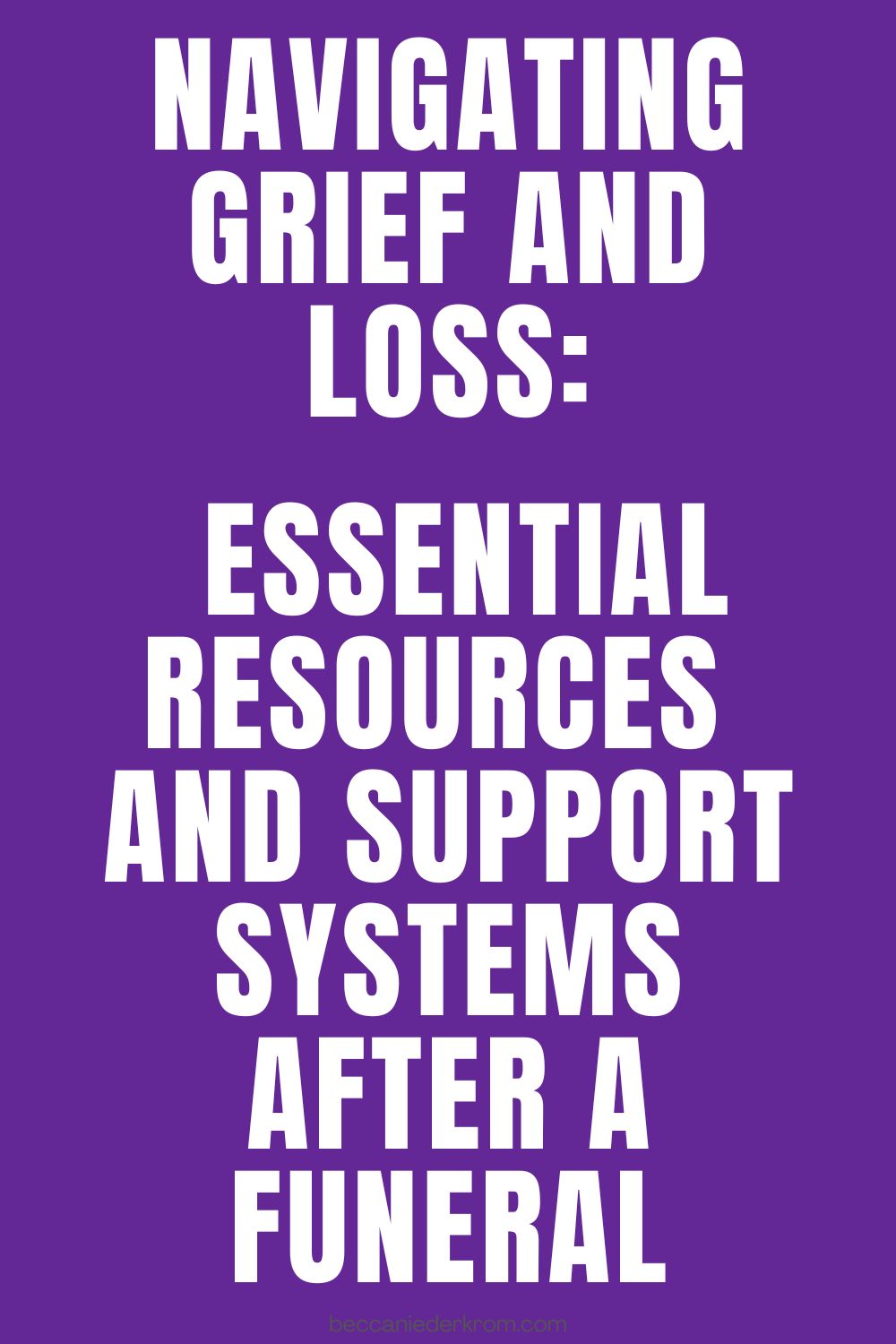We may earn money or products from the companies mentioned in this post. As an Amazon Associate I earn from qualifying purchases. Disclosure of Material Connection: Some of the links in this post may be "affiliate links." This means if you click on the link and purchase an item, I will receive an affiliate commission.
The journey through navigating grief and loss after a funeral can be one of the most challenging experiences in life. As we bid farewell to our loved ones, we often find ourselves overwhelmed by a whirlwind of emotions, practical concerns, and the daunting task of adjusting to a new reality. This comprehensive guide aims to provide you with essential resources and support systems to help navigate the complex terrain of grief, offering comfort, guidance, and hope during this difficult time.
Navigating Grief and Loss: Essential Resources and Support Systems After a Funeral
Grief is a deeply personal and unique experience, varying from individual to individual. It’s crucial to recognize that there is no “right” way to grieve, and the process can be unpredictable and non-linear. Common emotions associated with grief include sadness, anger, guilt, anxiety, and even relief. Understanding that these feelings are normal can be the first step in healing.
While not everyone experiences grief in the same way or order, Elisabeth Kübler-Ross’s five stages of grief provide a framework for understanding the grieving process:
-
Denial
-
Anger
-
Bargaining
-
Depression
-
Acceptance
It’s important to note that these stages are not a linear progression, and individuals may move back and forth between them or experience multiple stages simultaneously.

In the days and weeks following a funeral, the support of family, friends, and community can be invaluable. Here are some ways to seek and accept help:
1.
Don’t hesitate to reach out to loved ones for emotional support or practical assistance. Many people want to help but may not know how. Be specific about your needs, whether it’s help with meals, childcare, or simply having someone to talk to1.
2.
Connecting with others who are experiencing similar losses can provide comfort and understanding. Many communities offer grief support groups through local hospitals, hospices, or religious organizations.
3.
If you’re struggling to cope, consider reaching out to a grief counselor or therapist. These professionals can provide strategies for managing intense emotions and navigating the grieving process.
As time passes, the initial shock of loss may subside, but grief can persist. Developing healthy coping mechanisms is essential for long-term healing.
1.
Taking care of your physical and emotional well-being is crucial during the grieving process. Ensure you’re getting enough sleep, eating nutritious meals, and engaging in regular physical activity.
2.
Finding ways to honor and remember your loved one can be healing. This might include creating a memory book, participating in activities they enjoyed, or establishing a memorial fund in their name.
3.
It’s important to acknowledge and express your emotions rather than suppressing them. Whether through journaling, art, or talking with a trusted friend, find healthy outlets for your feelings.
4.
Healing takes time, and there’s no set timeline for grief. Be patient and compassionate with yourself as you navigate this journey.
Different types of loss may require specialized support. Here are resources for specific situations:
The Compassionate Friends is an organization dedicated to supporting families who have lost a child of any age. They offer support groups, online resources, and annual conferences.
GriefShare offers support groups specifically for those who have lost a spouse. Their program includes weekly meetings, video seminars, and personal workbooks.
The American Foundation for Suicide Prevention provides resources and support for those affected by suicide loss. They offer support groups, educational programs, and a network of loss survivors.
In today’s digital age, numerous online resources are available to provide support and information for those navigating grief:
1.
This website, founded by grief expert David Kessler, offers articles, videos, and webinars on various aspects of grief and loss.
2.
An online community providing education and support through articles, podcasts, and online courses focused on grief and bereavement.
3.
A platform that connects young adults who have experienced significant loss, facilitating peer support through virtual and in-person gatherings.
While emotional support is crucial, there are also practical matters to address following a funeral:
1.
Dealing with the deceased’s estate, will, and financial accounts can be overwhelming. Consider seeking the help of a legal professional or financial advisor to navigate these complexities.
2.
Sorting through your loved one’s possessions can be an emotional process. Take your time and consider enlisting the help of friends or family members.
3.
In the digital age, managing a deceased person’s online presence has become an important consideration. Platforms like Facebook offer options for memorializing accounts.
If you’re supporting someone who is grieving, here are some ways to offer meaningful help:
1.
Often, the most valuable support you can offer is a listening ear. Allow the grieving person to express their feelings without trying to “fix” their pain1.
2.
Concrete offers of assistance, such as preparing meals, running errands, or helping with household tasks, can be incredibly helpful.
3.
Anniversaries, birthdays, and holidays can be particularly difficult for those who are grieving. Reaching out on these days can provide much-needed support1.
It’s important to recognize when grief may be developing into more serious mental health concerns. Prolonged grief disorder or complicated grief may require professional intervention. Signs to watch for include:
-
Intense longing for the deceased that interferes with daily life
-
Difficulty accepting the death
-
Numbness or detachment
-
Bitterness about the loss
-
Feeling that life is meaningless without the loved one
If you or someone you know is experiencing these symptoms for an extended period, it’s crucial to seek professional help7.
Grief and mourning practices can vary significantly across cultures and religions. It’s important to respect and honor these differences, both in your own grieving process and when supporting others. Some cultural variations in mourning practices include:
-
Length of mourning period
-
Rituals and ceremonies
-
Expressions of grief (public vs. private)
-
Beliefs about the afterlife and connection with the deceased
Understanding and respecting these cultural nuances can provide comfort and a sense of continuity during the grieving process.
Returning to work after experiencing a loss can be challenging. Here are some strategies for managing grief in the workplace:
1.
Be open with your supervisor about your situation and discuss any accommodations you might need, such as flexible hours or a reduced workload.
2.
It’s okay to limit personal conversations about your loss if you’re not comfortable discussing it at work.
3.
Allow yourself moments to step away and process your emotions when necessary.
4.
Many workplaces offer counseling services through Employee Assistance Programs, which can be a valuable resource.
Reading about others’ experiences with grief can provide comfort and insight. Some recommended books on grief include:
-
“On Grief and Grieving” by Elisabeth Kübler-Ross and David Kessler
-
“The Year of Magical Thinking” by Joan Didion
-
“It’s OK That You’re Not OK” by Megan Devine
These works can offer perspective, coping strategies, and a sense of connection with others who have navigated loss.
Grief can have significant impacts on physical health. It’s not uncommon to experience:
-
Changes in sleep patterns
-
Fluctuations in appetite
-
Fatigue
-
Weakened immune system
Prioritizing physical health through regular check-ups, maintaining a balanced diet, and engaging in gentle exercise can support overall well-being during the grieving process.
Creating meaningful ways to remember and honor your loved one can be an essential part of the healing process. Some ideas include:
-
Creating a memory garden
-
Participating in charity events in their honor
-
Cooking their favorite meals
-
Sharing stories and memories with others
These rituals can provide comfort and a sense of ongoing connection with the deceased.
The internet and social media have transformed how we grieve and remember loved ones. Digital memorials, online support groups, and virtual candle-lighting ceremonies are just a few ways technology is shaping the grieving process. While these digital tools can provide valuable support, it’s important to balance online engagement with in-person connections and support.
Navigating grief and loss after a funeral is a deeply personal journey that requires time, patience, and support. By utilizing the resources and support systems available, practicing self-care, and allowing yourself to grieve in your own way, you can begin to heal and find a new sense of normalcy.
Remember that seeking help is a sign of strength, not weakness. Whether through professional counseling, support groups, or the compassion of friends and family, there are many avenues of support available to you.
As you move forward, honor your loved one’s memory while also honoring your own need for healing. The path through grief may be challenging, but with the right resources and support, it is possible to find hope, meaning, and even moments of joy amidst the sorrow.
If you’re struggling with grief, don’t hesitate to reach out for help. Organizations like The Compassionate Friends, GriefShare, and local mental health services are available to provide support and guidance. Remember, you are not alone in this journey, and there is hope and healing ahead.
See more in our initial piece in this series: The Complete Funeral Planning Guide: From Arrangements to Memorialization

